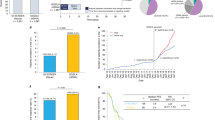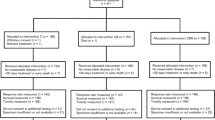Abstract
Colorectal cancer (CRC) can be classified into subtypes based on gene expression signatures. Patients with stage III enterocyte subtype of the CRC Assigner classifier have been shown to benefit from oxaliplatin adjuvant therapy. Here, we investigated whether single nucleotide polymorphisms (SNPs) in two enterocyte subtype-related genes, MS4A12 and CDX2, could predict the efficacy of oxaliplatin in first-line treatment for patients with metastatic CRC (mCRC). Three cohorts of patients were included: a discovery cohort receiving FOLFOX ± bevacizumab (BEV) (n = 146), a validation cohort receiving FOLFOXIRI + BEV (n = 230), and a control cohort receiving FOLFIRI + BEV (n = 228). SNPs were analyzed by PCR-based direct sequencing. In the discovery cohort, MS4A12 rs4939378 and CDX2 rs3812863 were identified as potential markers of efficacy. In the validation cohort, any G allele of MS4A12 rs4939378 was associated with longer progression-free survival (PFS) than the A/A variant in both univariate analysis (12.4 vs. 10.9 months, hazard ratio [HR] 0.70, 95% confidence interval [CI] 0.49–0.99, P = 0.033) and multivariable analysis (HR 0.65, 95%CI 0.44–0.97, P = 0.035) in patients expressing wild-type KRAS, but not mutant KRAS. In contrast, longer PFS was observed for patients expressing the CDX2 rs3812863 G/G variant than any A allele in univariate analysis (32.3 vs. 10.3 months, HR 0.39, 95%CI 0.19–0.81, P = 0.004) only in patients expressing mutant KRAS. These findings were not observed in the control cohort. Thus, MS4A12 and CDX2 SNPs may have utility as predictive biomarkers of response to oxaliplatin-based treatment in mCRC patients.
This is a preview of subscription content, access via your institution
Access options
Subscribe to this journal
Receive 6 print issues and online access
$259.00 per year
only $43.17 per issue
Buy this article
- Purchase on Springer Link
- Instant access to full article PDF
Prices may be subject to local taxes which are calculated during checkout


Similar content being viewed by others
References
Song N, Pogue-Geile KL, Gavin PG, Yothers G, Kim SR, Johnson NL, et al. Clinical outcome from oxaliplatin treatment in stage II/III colon cancer according to intrinsic subtypes: secondary analysis of NSABP C-07/NRG oncology randomized clinical trial. JAMA Oncol. 2016;2:1162–9.
Snoeck V, Goddeeris B, Cox E. The role of enterocytes in the intestinal barrier function and antigen uptake. Microbes Infect. 2005;7:997–1004.
Sadanandam A, Lyssiotis CA, Homicsko K, Collisson EA, Gibb WJ, Wullschleger S, et al. A colorectal cancer classification system that associates cellular phenotype and responses to therapy. Nat Med. 2013;19:619–25.
Koslowski M, Sahin U, Dhaene K, Huber C, Türeci O. MS4A12 is a colon-selective store-operated calcium channel promoting malignant cell processes. Cancer Res. 2008;68:3458–66.
Koslowski M, Türeci O, Huber C, Sahin U. Selective activation of tumor growth-promoting Ca2+ channel MS4A12 in colon cancer by caudal type homeobox transcription factor CDX2. Mol Cancer. 2009;8:77.
Dalerba P, Sahoo D, Paik S, Guo X, Yothers G, Song N, et al. CDX2 as a prognostic biomarker in stage II and stage III colon cancer. N Engl J Med. 2016;374:211–22.
He L, Deng HY, Wang C, Decreased X. expression of MS4A12 inhibits differentiation and predicts early stage survival in colon cancer. Neoplasma. 2017;64:65–73.
Loupakis F, Cremolini C, Masi G, Lonardi S, Zagonel V, Salvatore L, et al. Initial therapy with FOLFOXIRI and bevacizumab for metastatic colorectal cancer. N Engl J Med. 2014;371:1609–18.
Suenaga M, Mizunuma N, Matsusaka S, Shinozaki E, Ueno M, Yamaguchi T. Retrospective analysis on the efficacy of bevacizumab with FOLFOX as a first-line treatment in Japanese patients with metastatic colorectal cancer. Asia Pac J Clin Oncol. 2014;10:322–9.
Lee PH, Shatkay H. F-SNP: computationally predicted functional SNPs for disease association studies. Nucleic Acids Res. 2008;36:D820–4. Database issue
Kim SR, Song N, Yothers G, Gavin PG, Allegra CJ, Paik S, et al. Tumour sidedness and intrinsic subtypes in patients with stage II/III colon cancer: analysis of NSABP C-07 (NRG Oncology). Br J Cancer. 2018;118:629–633.
Dalerba P, Kalisky T, Sahoo D, Rajendran PS, Rothenberg ME, Leyrat AA, et al. Single-cell dissection of transcriptional heterogeneity in human colon tumors. Nat Biotechnol. 2011;29:1120–7.
Drew JE, Farquharson AJ, Mayer CD, Vase HF, Coates PJ, Steele RJ, et al. Predictive gene signatures: molecular markers distinguishing colon adenomatous polyp and carcinoma. PLoS ONE. 2014;9:e113071.
Ren D, Zheng G, Bream S, Tevebaugh W, Shaheen NJ, Chen X. Single nucleotide polymorphisms of caudal type homeobox 1 and 2 are associated with Barrett’s esophagus. Dig Dis Sci. 2014;59:57–63.
Findlay JM, Middleton MR, Tomlinson I. Genetic biomarkers of Barrett’s esophagus susceptibility and progression to dysplasia and cancer: a systematic review and meta-analysis. Dig Dis Sci. 2016;61:25–38.
Bae JM, Lee TH, Cho NY, Kim TY, Kang GH. Loss of CDX2 expression is associated with poor prognosis in colorectal cancer patients. World J Gastroenterol. 2015;21:1457–67.
Aasebø K, Dragomir A, Sundström M, Mezheyeuski A, Edqvist PH, Eide GE, et al. CDX2: a prognostic marker in metastatic colorectal cancer defining a better BRAF mutated and a worse KRAS mutated subgroup. Front Oncol. 2020;10:8.
Orlandi A, Di Salvatore M, Bagalà C, Basso M, Strippoli A, Plastino F, et al. ERCC1 induction after oxaliplatin exposure may depend on KRAS mutational status in colorectal cancer cell line: in vitro veritas. J Cancer. 2015;6:70–81.
Maddukuri L, Dudzińska D, Tudek B. Bacterial DNA repair genes and their eukaryotic homologues: 4. The role of nucleotide excision DNA repair (NER) system in mammalian cells. Acta Biochim Pol. 2007;54:469–82.
Kokoska ER, Wolff AB, Smith GS, Miller TA. Epidermal growth factor-induced cytoprotection in human intestinal cells involves intracellular calcium signaling. J Surg Res. 2000;88:97–103.
Acknowledgements
This work was partly supported by the National Cancer Institute (grant number P30CA014089), The Gloria Borges WunderGlo Foundation—The Wunder Project, Dhont Family Foundation, San Pedro Peninsula Cancer Guild, Daniel Butler Research Fund and Call to Cure Fund. Mitsukuni Suenaga is the recipient of Takashi Tsuruo Memorial Fund. Martin D. Berger received a grant from the Swiss Cancer League (BIL KLS-3334-02-2014) and the Werner and Hedy Berger-Janser Foundation for cancer research. YM received a grant from Japan Society for the Promotion of Science (S2606). We thank Anne M. O’Rourke, PhD, from Edanz Group (www.edanzediting.com/ac) for editing a draft of this manuscript.
Author information
Authors and Affiliations
Corresponding author
Ethics declarations
Conflict of interest
All authors have read the journal’s policy on disclosure of potential conflicts of interest. CC is a consultant/advisory board member for Roche, Amgen, Bayer, Merck Serono, Servier. AF is a consultant/advisory board member for Bayer, Roche, Amgen, Eli-Lilly, Merck Serono, Bristol-Myers Squibb, Sanofi, and Servier. H-JL is consultant /advisory board member for Bristol-Myers Squibb, Merck Serono, and Bayer. All remaining authors have no conflicts of interest to declare in this work.
Additional information
Publisher’s note Springer Nature remains neutral with regard to jurisdictional claims in published maps and institutional affiliations.
Rights and permissions
About this article
Cite this article
Suenaga, M., Schirripa, M., Cao, S. et al. Clinical significance of enterocyte-specific gene polymorphisms as candidate markers of oxaliplatin-based treatment for metastatic colorectal cancer. Pharmacogenomics J 21, 285–295 (2021). https://doi.org/10.1038/s41397-021-00207-x
Received:
Revised:
Accepted:
Published:
Issue Date:
DOI: https://doi.org/10.1038/s41397-021-00207-x



